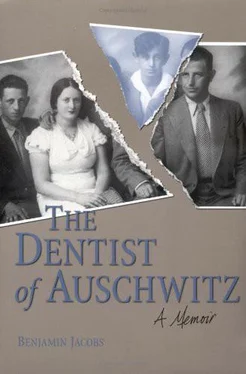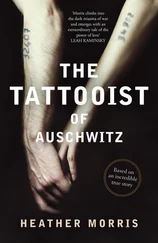Although Hoch und Tiefbaugesellschaft was strictly a German concern, the three Poles—Witczak, Kmiec, and Basiak—ran this part of the project. Kmiec and Basiak were of the Polish intelligentsia, while Witczak was not of the gentry. Kmiec and Basiak often expressed their disgust for Germany’s treatment of us, but I never knew Witczak’s opinion.
At four in the afternoon work ceased. On the way back to Steineck, guards tried to teach us to march in rhythm. They would yell, “One, two, three, four! What do people say when they see you looking like wobbling ducks?” To us, exhausted, tired slaves, it mattered little what people said. How could one expect Cantor Pinkus and other scholars, who had lived so long in a world where goose stepping didn’t exist, to march? They had spent most of their lives in Talmud study and in teaching spiritual enrichment. In time the guards became convinced we were too fatigued and accepted our marching in the only way we knew how.
When we finally arrived back in camp, the yard became a beehive of activity. Inmates were trying to attend to their personal cares all at the same time. Many brothers, fathers, and sons were assigned to different groups, and changes were nearly impossible. When we returned, those already in camp surrounded us to talk about their work. We were all doing the same thing: laying rails.
That night I lay thinking of Zosia. In the dark I saw her face. At 4:00 A.M. I was so deeply asleep that even the sharp school bells couldn’t awaken me. It was my father’s tugging that brought me to my feet.
The inmates’ strength was waning, and we had to find ways to substitute our meager camp rations of coffee substitute, mortar bread, and fake marmalade. We had all heard the aphorism “Necessity is the mother of invention.” We flattened the ends of spoon handles with rocks, to make a knife-and-spoon combination.
After breakfast rations our group assembled, and we went to the gate, where Tadek, the chief guard, took charge of us. It was only our second day of work, and already life had become a routine. The sky looked threatening, but no rain fell. The thought of Papa still working under Schmerele nagged at me. I had to try and get him out of there soon.
We reached the construction barracks a little before seven. Stasia, Witczak, and his foremen waited. The shovels, picks, and wheelbarrows were outside the shed. After Tadek’s report, inmates were ordered to follow their foremen. “If your foreman isn’t present,” said Witczak, “go to your site and begin where you left off yesterday.”
Stasia left Marek and me at the barracks and escorted her three helpers to the potatoes and knives. Marek and I left for the spring, without a guard. It was only a few minutes after seven, too early to expect the girls. Close to eight, we had just filled our pails for the second time when we heard them coming. “Good day,” they cheerfully said, reaching the spring.
“Good day,” we answered.
That day lacked the curiosity and spontaneity of the day before. We even talked about the weather. Only Zosia seemed to have retained a gentle fascination for us. I thought she looked as if she wanted to say something. Jadzia broke the ice. “We had few Jewish students in school,” she said. Kazia and Halina agreed.
“I had a music teacher, Mr. Kaplan, who gave me private piano lessons. I think he was half Jewish. I liked him a lot,” Zosia said. “He and his wife were already old when the war began. I don’t know what became of them.”
“You said that you are married and have two children,” Kazia queried Marek.
“Yes, my son is nine, and my daughter is three. Next week will be her birthday,” he replied. From his breast pocket he pulled out a brown leather billfold with his initials in gold and showed them a picture of his wife and children. Like any proud father, he watched their faces as the postcard-sized picture was passed around.
“What an attractive wife you have, and what beautiful children,” they said. “Can they write to you?” one asked.
“They are still allowed to send mail from the ghetto, but we won’t receive it,” answered Marek.
The girls looked at each other, amazed. “What harm is there in your having contact with your families?” Kazia asked. “If you’d like to write to them,” she said, “a letter or a postcard, we’ll be happy to send it out for you.”
“How gracious of you,” Marek responded in impeccable Polish. His good manners were not those of a water carrier. He thanked them and gratefully accepted their offer.
I seized the opportunity and asked if I too could send a letter to my relatives. Halina quickly agreed, and so did Zosia. “Gladly,” they said.
We reminded ourselves that our delayed return might bring someone to look for us, and Stasia surely would miss the water. Since it was way past nine, the girls too were expected at work. A large box rested at Zosia’s side, a collective endeavor, I thought. Discreetly, lest she embarrass us, she pointed to the box. “We brought it for you.” Knowing that such a gift would not deprive them, we accepted it. As they were leaving, Zosia turned to me. “Bronek, can you come here at lunchtime? We are free between twelve and one. Can you come?”
“I think so,” I answered. A certain warm feeling touched me inside. Was she interested in me? Then they left us, taking with them their vitality, the vitality of freedom.
We hid the food, picked up the pails, and left. On our return Witczak was walking around impatiently. I soon learned, though, that this was his habit. He never stood still. Seeming to be in a hurry always, he walked fast while talking to people behind him. As we approached him, he signaled me to follow him.
“Yes, Herr Obermeister,” I said, following close behind. He didn’t answer.
We passed the toolshed and the administrators’ dining room and entered an office. No one was there. Witczak pointed to a desk at the yard window. On it, surveyor’s manuals and books were stacked against the wall. He picked up a ledger. “From now on you’ll keep a daily record of the people you bring,” he said. “You’ll also enter their time of arrival and the number of hours each worked. As you probably know, we pay the camp for what you do.” This was news to me. From an open drawer he took out a list, apparently the one Tadek had given him. “Use this desk,” he said, fidgeting as he left.
“Yes, Mr. Witczak,” I said, but it was too late for him to hear it. He was on his way to the sites.
A stuffy, pinesap aroma permeated the air. Except for the three desks and chairs and one drafting table, which were all well worn, the office was bare. I opened the door and found Marek waiting outside. In the two days we had worked together, I had liked being with him and had learned a lot from his experiences. At times we sat and listened to the sound of water rushing at the spring, thinking of the magical moment when the girls had unexpectedly come upon us. Will I get to see Zosia again? I wondered. “Mr. Witczak wants me in the office,” I said to Marek.
He was disappointed. As I began to work at my new job, Witczak’s remark to me, “We pay for your work,” rang in my ears. I never thought that the Nazis would be selling people’s suffering. To hear that they were selling our labor was shocking. I opened the ledger and began to enter the names of the foremen alphabetically, along with the inmates assigned to them and the hours worked each day. Certain names on the list were of people from Dobra. I thought of our common past.
Shortly thereafter Stasia came in, her face beaming. She indicated her influence at the camp. “You know, when Mr. Witczak said he’d like to have someone to help him in the office, I suggested you,” she said. “Mr. Witczak is a good man,” she continued, making sure I got the intent of her comment. “I think you are nice, Bronek, and even though he may not show it, he too likes you. In his position he has to be careful.”
Читать дальше












